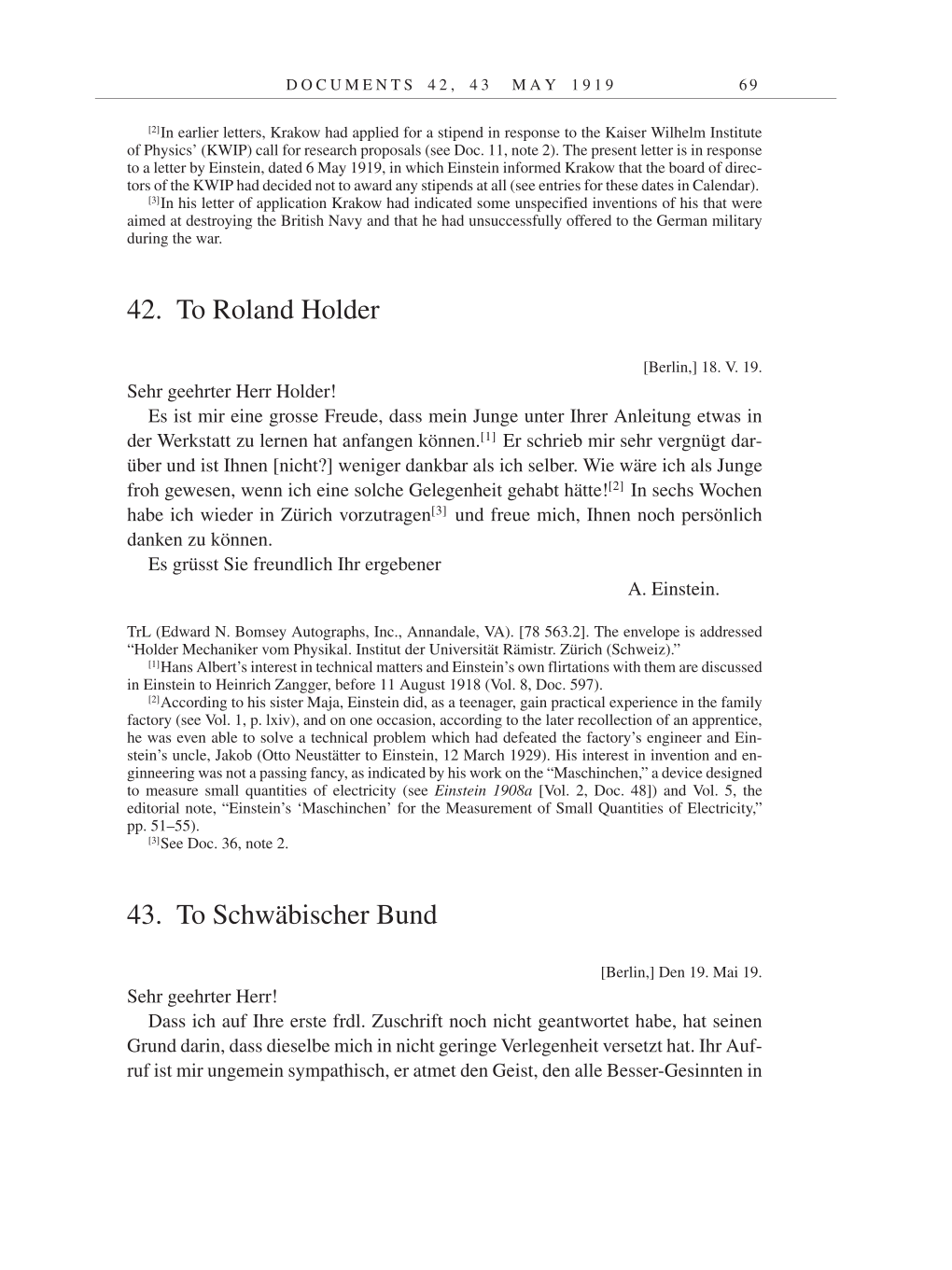D O C U M E N T S 4 2 , 4 3 M A Y 1 9 1 9 6 9
[2]In earlier letters, Krakow had applied for a stipend in response to the Kaiser Wilhelm Institute
of Physics’ (KWIP) call for research proposals (see Doc. 11, note 2). The present letter is in response
to a letter by Einstein, dated 6 May 1919, in which Einstein informed Krakow that the board of direc-
tors of the KWIP had decided not to award any stipends at all (see entries for these dates in Calendar).
[3]In his letter of application Krakow had indicated some unspecified inventions of his that were
aimed at destroying the British Navy and that he had unsuccessfully offered to the German military
during the war.
42. To Roland Holder
[Berlin,] 18. V. 19.
Sehr geehrter Herr Holder!
Es ist mir eine grosse Freude, dass mein Junge unter Ihrer Anleitung etwas in
der Werkstatt zu lernen hat anfangen
können.[1]
Er schrieb mir sehr vergnügt dar-
über und ist Ihnen [nicht?] weniger dankbar als ich selber. Wie wäre ich als Junge
froh gewesen, wenn ich eine solche Gelegenheit gehabt
hätte![2]
In sechs Wochen
habe ich wieder in Zürich
vorzutragen[3]
und freue mich, Ihnen noch persönlich
danken zu können.
Es grüsst Sie freundlich Ihr ergebener
A. Einstein.
TrL (Edward N. Bomsey Autographs, Inc., Annandale, VA). [78 563.2]. The envelope is addressed
“Holder Mechaniker vom Physikal. Institut der Universität Rämistr. Zürich (Schweiz).”
[1]Hans Albert’s interest in technical matters and Einstein’s own flirtations with them are discussed
in Einstein to Heinrich Zangger, before 11 August 1918 (Vol. 8, Doc. 597).
[2]According to his sister Maja, Einstein did, as a teenager, gain practical experience in the family
factory (see Vol. 1, p. lxiv), and on one occasion, according to the later recollection of an apprentice,
he was even able to solve a technical problem which had defeated the factory’s engineer and Ein-
stein’s uncle, Jakob (Otto Neustätter to Einstein, 12 March 1929). His interest in invention and en-
ginneering was not a passing fancy, as indicated by his work on the “Maschinchen,” a device designed
to measure small quantities of electricity (see Einstein 1908a [Vol. 2, Doc. 48]) and Vol. 5, the
editorial note, “Einstein’s ‘Maschinchen’ for the Measurement of Small Quantities of Electricity,”
pp. 51–55).
[3]See Doc. 36, note 2.
43. To Schwäbischer Bund
[Berlin,] Den 19. Mai 19.
Sehr geehrter Herr!
Dass ich auf Ihre erste frdl. Zuschrift noch nicht geantwortet habe, hat seinen
Grund darin, dass dieselbe mich in nicht geringe Verlegenheit versetzt hat. Ihr Auf-
ruf ist mir ungemein sympathisch, er atmet den Geist, den alle Besser-Gesinnten in
